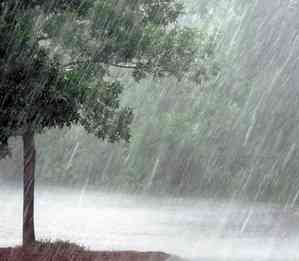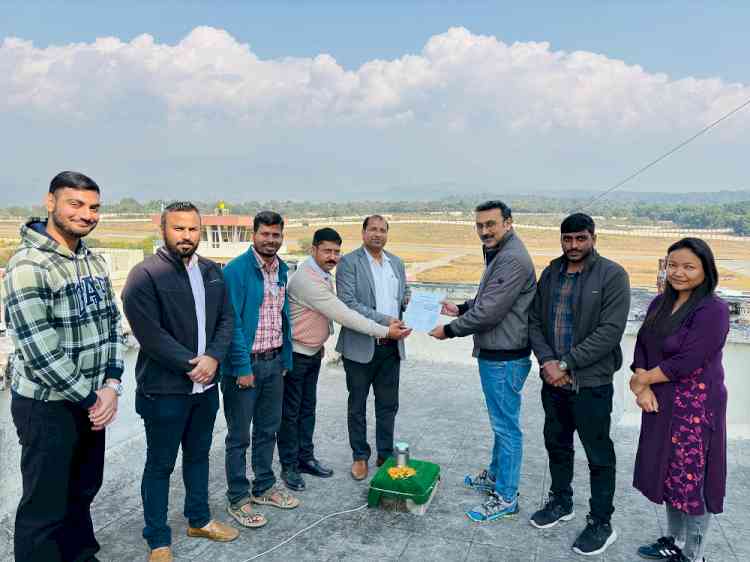Heavy rains in TN till Oct 16 as cyclonic circulation forms over Bay of Bengal
The Regional Meteorological Centre (RMC) has predicted heavy to very heavy rains in Tamil Nadu from October 12-16, due to a fresh cyclonic circulation likely to form over the Bay of Bengal on Saturday.

Chennai, Oct 12 (IANS) The Regional Meteorological Centre (RMC) has predicted heavy to very heavy rains in Tamil Nadu from October 12-16, due to a fresh cyclonic circulation likely to form over the Bay of Bengal on Saturday.
On Saturday, western ghats and adjoining districts have chances of receiving heavy and intense rainfall, the weather department said.
The weather department also said that some delta districts would get very heavy rainfall up to 24.4 cm on Sunday and Monday.
RMC added that Chennai, Tiruvallur and Kancheepuram districts too have chances of heavy rainfall on Monday.
Two prevailing weather systems in the Arabian Sea and the Bay of Bengal have pushed moisture into the region.
The RMC has said that most places in Tamil Nadu, Puducherry and Karaikal would experience moderate rainfall (up to 6 cm) till October 16.
The weather department also said that few coastal weather stations received rainfall in the past 24 hours and seven places registered heavy rainfall.
Makkinampatti in Coimbatore district received 12 cm rain, which was the highest amount of rainfall recorded in the state during the period.
Officials said that the interaction between the weather systems would be monitored for the arrival of northeast monsoon.
The southwest monsoon, according to RMC, is to retreat completely from states like Uttar Pradesh, Gujarat and Madhya Pradesh in a couple of days for the setting in of northeast monsoon.
India Meteorological Department had forecast that the Northeast monsoon was likely to set in around October 17.
The RMC said that a low pressure area over Lakshadweep and adjoining southeast and east-central Arabian Sea, are likely to gain strength as the depression would enhance easterlies and rainfall over the state.
Typically, the northeast monsoon begins around October 20, but the IMD stated that it is common for the monsoon to set in nine days before or after this date.
The weather department mentioned that there will likely be a rainfall deficit in the southern districts compared to the northern ones.
However, the central regions of the state are expected to receive abundant rain.
Additionally, the IMD predicted that the southern peninsular region, including Tamil Nadu, Kerala, and Andhra Pradesh, is likely to experience above normal rainfall during the Northeast monsoon.
The IMD forecast indicates enhanced rainfall in Tamil Nadu during the third and fourth weeks of October.
According to the weather department, Tamil Nadu typically receives an average of 44 cm of rainfall during the northeast monsoon, which extends from October to the end of December.
The IMD also mentioned the possible impact of La Niña, a weather phenomenon that could result in a change in the pattern of rainfall.
Historically, Tamil Nadu has experienced surplus rainfall 69 per cent of the time during La Niña events, occurring 42 times between 1940 and 2021.
In the years 2010, 2016, and 2023, when La Niña occurred, there was surplus rainfall in 2010 and 2023, but in 2016 the state experienced a rainfall deficit.
The IMD also noted that changing weather dynamics, along with factors such as global warming, are influencing rainfall patterns during both the southwest and northeast monsoons.
The department stated that it has improved its forecasting methods and now achieves 85 per cent accuracy in its predictions.
Meanwhile, the Tamil Nadu government is preparing for the monsoon with district disaster management authorities working closely with district administrations and other departments, including health, police, and fire and rescue services, to plan for potential inundation and flooding due to heavy rains.
Local authorities have been instructed to clean stormwater drains and carry out basic road repairs, including covering pits, to prevent water stagnation and clogging.
--IANS
aal/kvd


 IANS
IANS 













